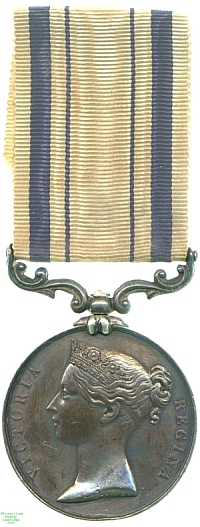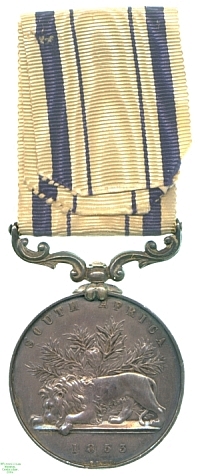
Obverse, a bust of Queen Victoria

Reverse, a lion couchant before a mimosa bush; in the exergue the date "1853"

Obverse, a bust of Queen Victoria |

Reverse, a lion couchant before a mimosa bush; in the exergue the date "1853" |
The British takeover of Netherlands East Indies Company territories in South Africa during the Napoleonic Wars passed on the competition that the Dutch settlements faced with the indigenous tribes of the Xhosa people (known to the Boers and British of the time as Kaffirs) over grazing land and the general control of the territories. A total of nine Cape Frontier Wars (or Xhosa or Kaffir Wars, depending on the politics of the historian in question) are counted between the Xhosa and Boers or British, for British service in the sixth to eighth of which, in 1834-1836, 1846 and 1851-1853, it was in 1854 decided to sanction a medal (the ninth, of 1877-1879, received a separate award later). This medal bore the date 1853, but was awarded to survivors of any of the engagements, and which war a recipient fought in can only be determined from the medal roll.
The 1834-1836 campaigns involved the Tambuki and Amapondi tribes, who had invaded Delagoa Bay and slaughtered the Portuguese settlement there before turning south against the British. The main difficulty in quelling this rising was not losing the support of those tribes who had had nothing to do with it. Both the 1846 and 1851-1853 engagements were fought against the Gaika tribe under Chief Sandilli, who resented British land encroachments, had recently begun to receive fire-arms and were difficult opponents in a more simply military sense.
In 1851 the situation was so bad as to necessitate reinforcement, which became famous because of the troopship HMS Birkenhead, which struck a rock off what is now Gansbaai on the Western Cape. The ship sank in 20 minutes and the soldiers aboard stood fast rather than escape so as to allow the women and children to reach the lifeboats in safety. This event, which gave rise to the saying "Women and children first!", achieved European currency and Emperor Wilhelm I of Prussia had its story read out on parade in every barracks in Germany.
This medal was awarded to Private Thomas F. Fleming of the Cape Mounted Riflemen. His unit were deeply involved in all the campaigns for which the medal was awarded, and only further research would reveal in which of the wars' engagements he saw service. Lester Watson acquired his medal at some point before 1928.